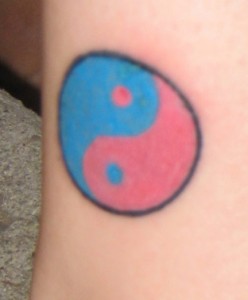Read a “how to be successful” book and it will tell you to start with a 5 year goal, then break it down to 5 individual yearly goals, then break those down to monthly goals, then to weekly and eventually to daily goals. The idea being that you set your sights on where you want to be and break it down to the steps you need to take to get there.
When our child is diagnosed with autism, we tend to focus on them having a family of their own one day, a steady job and all that “normal” stuff we think will be what makes our child a happy grown up some day. Then we deconstruct that backwards into smaller goals. With autism, it’s not as easy to break down into daily or even weekly goals but that’s what we’re thrown into by way of scheduled therapy sessions, ABA and strict routines.
And when something doesn’t appear to be working, we change paths. Our focus being the goal no matter which path we need to get there. Rightly so, I mean, this is our children we’re talking about. A parent does what ever a parent needs to do for their child.
When Cameron was diagnosed, we were faced with a lot of wait lists. We were in the right place to get the best therapists and everything that Cameron would need but we’d have to wait until after he was 5 years old to get it. We searched around and found a school with a new autism program where a select few classes are specifically for autistic children.
We were faced with a choice: wait for what we were told are the best services available or move, losing most of everything we had, and get immediate help but unsure of how well it would go. Back then, all we knew was that it was a new program at a little school in a little town. So, start immediately with the unknown or wait several years for the best.
I look back at it as more than just a choice of starting then or starting later, I see it as choosing between the end goal and the path to get to that goal.
Focusing on the end goal, to me, is a way of focusing on the problem. You still love your child and want what’s best for them, but you’re so very focused on removing what ever road block is in front of them that the path to reaching that goal becomes unimportant.
You spend your time talking about the problem, dwelling on the problem, asking for advice on the problem, reading about the problem, writing about the problem, trying different things to solve the problem… eventually the people close to you hear you talking more about the problem than about your actual child. They’d never tell you that and it would never feel like that but let’s face it, you become a bit of a downer dude.
In this way, the problem becomes your path to the goal. “What ever it takes” is driven by the road block, by your drive to over come that road block and reach the end goal.
Focusing on the path, however, allows you to still get to your end goal but the way in which you look at and approach the situation can be drastically different.
Consider this, that the one key constant between now, your end goal, all of the road blocks, all of the successes and everything in between, is your child.
Given all of that, if you could choose only one thing to put your focus on and keep it there, what would it be?
It’s not that I suggest giving up on anything, only shifting your point of view a bit.
You can’t force the future to be what you want it to be, you can only do your best here and now, in the present and trust that it will be enough to take you to the future that you want. What you have right now are not problems to be solved in order to get the outcome you desire.
You have a child. A child that is waiting for you to line up some cars too. To spin them on their roof. To get more building blocks for sorting by color. For sitting down and drawing trees, or trains or what ever they love to draw too. A child that loves you so very much even if they can’t find a way to express it to you. A child who doesn’t want you to think they’re a burden and certainly not a problem for you to solve.
The path to the goal? It’s a kiss on the head as they sleep. It’s a rare hug out of nowhere. It’s a favorite blanket that you always remember to have for them. It’s giving them the freedom to leave the dinner table in between bites if they have to. It’s in reading the same bedtime story 5 years in a row.
By the way, that school that we gave up everything for? Best decision ever. The teachers, EAs and entire school is just so kind, caring, nurturing and understanding that I believe Cameron never would have come as far if we had gone to “the best”.
We focused on our child. In letting him be a child. In joining him on his path rather than forcing him to take our path.
If you want a new house or a car or a boat, make yourself a plan of action and focus on your goal.
If you have a child with autism, make yourself a goal and then focus on your child. With your love and support, your guidance and encouragement, they’ll lead you to it. You’ll just have to follow their path.

Make your path the goal














